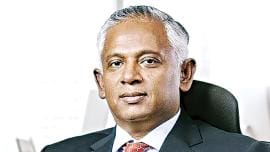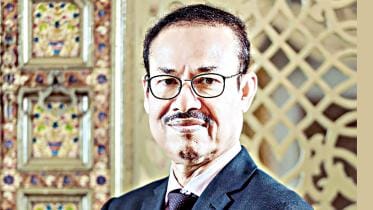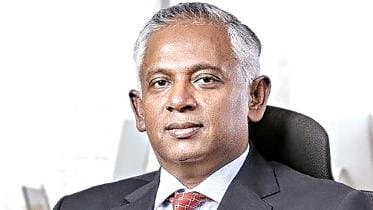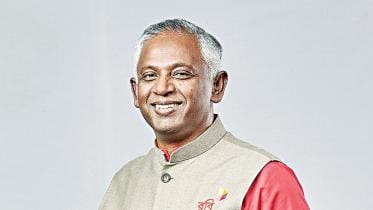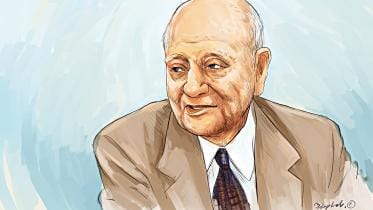The cost of the FDI roller coaster and the price we pay
18 January 2026, 00:00 AM
The women banks still ignore
13 January 2026, 00:25 AM
Driving export growth
11 January 2026, 00:00 AM
The cost of being right
9 January 2026, 05:50 AM
Bangladesh needs an economic nerve centre
7 January 2026, 18:00 PM
Column
Economy is now at a turning point
6 January 2026, 18:00 PM
Column
2025 was a testing year for RMG sector
5 January 2026, 18:00 PM
Column
Bangladesh is producing graduates, not skills
4 January 2026, 18:00 PM
Column
An economic miracle in 2026 is unlikely
3 January 2026, 18:00 PM
Column
How ready is Bangladesh for the era of AI?
22 December 2025, 12:02 PM
Column
Bangladesh needs an economic nerve centre
Today, our economy is steered by powerful bodies
7 January 2026, 18:00 PM
Economy is now at a turning point
Political clarity has therefore emerged as a decisive factor shaping the outlook
6 January 2026, 18:00 PM
2025 was a testing year for RMG sector
Bangladesh’s export engine, long powered by the ready-made garment (RMG) sector, slowed in 2025 amid overlapping domestic and external shocks.
5 January 2026, 18:00 PM
Bangladesh is producing graduates, not skills
Bangladesh operates one of the most fragmented education systems in the world
4 January 2026, 18:00 PM
An economic miracle in 2026 is unlikely
Bangladesh’s economy showed signs of consolidation in 2025. Market liquidity, especially foreign currency liquidity, improved significantly, driven by a rise in wage earners’ remittances, a moderate increase in exports, and higher foreign aid disbursement. Inflation, however, continued to remain stubbornly high.
3 January 2026, 18:00 PM
How ready is Bangladesh for the era of AI?
AI does not fail loudly at first -- it fails silently, at scale
22 December 2025, 12:02 PM
Remittance boom faces an AI test
Considering the core economic indicators of Bangladesh, remittance inflow has become the strongest factor at present, driven by a historic surge. Remittances crossed $30 billion in the last fiscal year 2024-25, helping to stabilise the exchange rate and bolster foreign currency reserves.
17 December 2025, 18:00 PM
Why honest borrowers lose out in Bangladesh
NPLs in the banking sector surged to around 34 percent by late 2025
16 December 2025, 18:00 PM
One app for all payments
Payment Initiation Service (PIS) is a smarter way to make payments directly from a bank account or mobile financial service wallet using a single application.
15 December 2025, 18:42 PM
Responsible banking
Textbooks remind us that a bank's core functions include financial intermediation, maturity transformation, efficient credit allocation and payment facilitation
13 December 2025, 18:00 PM
Who is raising our children now?
If Bangladesh suddenly bans social media for everyone under sixteen, the first shock will not shake the earth. It will shake the nation’s emotions.
11 December 2025, 18:00 PM
Put domestic industry and business first
Historically, governments have used construction to fight stagflation and recession
10 December 2025, 18:00 PM
Banking in the 2030s
Banking is going through a rapid global transformation unlike anything seen before. Large international banks are shifting from retail banking to wealth management.
9 December 2025, 18:00 PM
The power of focused growth
Andrew Carnegie, the American industrialist and steel tycoon who later devoted much of his wealth to social welfare, once said, “Put all your eggs in one basket and then watch that basket.”
8 December 2025, 18:00 PM
Smart corporate robbery
There is an old joke in corporate circles: a burglar breaks into a house, finds nothing worth stealing, and leaves a thank-you note for wasting his time.
4 December 2025, 18:00 PM
Cash transactions hold back economic growth
In principle, there is nothing wrong with cash financial transactions. The problem arises when they are used to evade tax, launder money, facilitate illegal deals or pay bribes. In such cases, the transactions become questionable.
3 December 2025, 18:00 PM
Are we giving up thinking to AI?
There has long been a fear that new technologies weaken human abilities. Socrates worried that writing would erode memory.
2 December 2025, 18:00 PM
Forensic audits for trustworthy governance
With over three decades in Bangladesh’s banking sector, I’ve witnessed its resilience, potential, and persistent weaknesses.
1 December 2025, 18:00 PM
Why restricting use of IPO proceeds misses the real problem
The Bangladesh Securities and Exchange Commission (BSEC) recently released its draft rules for initial public offerings (IPOs), which propose a strict prohibition on using IPO proceeds to repay loans. The draft also introduces several other controls over how companies may deploy funds raised from the public. These rules raise a key question about the appropriate level of flexibility companies should have when allocating capital raised from shareholders.
30 November 2025, 18:00 PM
Remembering Matiul Islam: A young man who died at 95
Bangladesh has lost one of its most enduring builders. M Matiul Islam, the country’s first finance secretary and a pioneering figure in the nation’s economic architecture, passed away on November 20 at the age of 95.
29 November 2025, 20:21 PM


